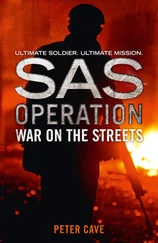He thought he saw something rising and falling in a trough and, to brace his heavy 7x50s, planted both elbows on the windscreen. Gulls. Then he heard Sonar Officer Garborg’s voice in the CIC on Two Deck boom from the bridge speaker.
“Captain, possible contact dead ahead!”
Bayer rolled on a shoulder and said, “Mr. Dass.”
“Aye, sir, I have it. Range?” Dass queried CIC.
“Under eight thousand meters.”
“Any matches?”
“Propagation is poor. Trace only.”
“Signals!” Bayer snapped.
“Aye, sir?” said the yeoman.
“Raise Narvik by voice. Advise we have a contact. Bearing, et cetera. Query same.”
“Aye, aye, sir.”
Bayer planted his binoculars on the heaving purple sea roaring white around the Trondheim’s cutwater and through her hawse pipes and ground tackle. He knew there was nothing to see, but in his gut felt certain that a submarine was out there, trying to escape into deep water.
The frigate pounded hard, her decks chopping up, down, up. Bayer, braced against the windscreen, swung his glasses to starboard and saw the Narvik take white water over her bow. In the east the sky had failed to brighten—in fact, had gotten darker. “Damn the weather,” Bayer muttered. Something to be concerned about when towing a seven-ton sonar transducer at the end of a four-inch-diameter cable fifty meters below the surface. The armored cable, forty-eight pairs of signal conductors running its length, was not indestructible, and Bayer had had one part a year ago while hogging in on a contact that turned out to be a biological. He weighed reducing speed but decided not to.
Bayer slammed the bridge speaker’s Talk button with the heel of his gloved hand. “Mr. Garborg, this is the captain.”
“Aye, Captain?”
“I don’t appreciate your silence, Mr. Garborg. I want constant ranges and bearings.”
“Aye, sir. At the moment we’re getting only scatter, no positives.”
“In panoramic?”
“Yes, sir.”
Once again, thought Bayer, geography, salinity, time of year, sea state were favoring the enemy. “What’s your cadence?”
“One thousand to thirty thousand meters, sir.”
“Well, stay at it, Mr. Garborg.”
“Aye, aye, sir.”
Bayer snapped the speaker off and turned to his executive officer. “Mr. Dass.”
“Sir?”
“Send Mr. Mayan below to Sonar. I want them to feel his hot breath on their necks.”
“Aye, aye, sir.” Dass, carefully gauging each step across the heaving deck, headed for the CIC, where Weapons Officer Mayan and his technicians were busy monitoring the Trondheim’s fire control gear.
“Captain, Narvik sends,” announced the signals yeoman. He wore a mike and headset trailing a long cord plugged into a remote repeater.
“Well?” Bayer said. “I’m not deaf. Give me the short version.”
“From Narvik: ‘Contact negative across three sectors. Await your advisory.’ ”
Bayer blew through his teeth. “Send them…send them, ‘Contact impaired. Maintain current pattern.’ ”
Bayer wanted to bully Garborg again but thought better of it. He stalked onto the port wing and looked aft. He saw a huge winch and sheave arrangement mounted on the fantail, from which the thick black VDS cable paid out from a supply spool midships and over the sheave, where it disappeared into the Trondheim’s boiling wake, which had spread to the horizon like a bridal veil. He looked south toward the plunging Narvik and saw a similar scene of gear, cables, and flying spume.
Bayer spun on his heel. “Sonar!” he bellowed into the speaker. “This is the captain. What the hell’s going on down there? Do we have a contact?”
“Negative, sir.” It was Mayan’s voice. “Zero trace on all inputs.”
“Not even biologicals?”
“Nothing, sir.”
“I don’t believe it.”
“I beg your pardon, sir?”
Bayer looked north as he collected his thoughts. He didn’t doubt that he was hunting a Russian submarine but had underestimated her skipper’s determination to avoid detection, a challenge Bayer couldn’t overlook. My mistake, he thought. It won't happen again.
“Kapitan, the Norwegians are turning south.”
Litvanov nodded.
“Have they lost contact with us?” Zakayev said.
“They never had contact,” Litvanov said.
Zakayev watched Starpom Veroshilov mark the double track of the Norwegian frigates on the chart, a long, sweeping U-turn that would put them on a southerly track.
“This Norwegian skipper is going to retrace his steps. By the time he gets turned around, we’ll be gone.”
Zakayev felt the tension ebb. The girl’s color had returned.
Litvanov, all smiles, opened the SC1 mike. “Secure fire control, secure torpedo stations.”
The men in the CCP relaxed. They exchanged satisfied looks and gave a thumbs-up.
Litvanov opened the mike again, “Mischa…where are you?”
The SC1 hummed, then the voice of the messman said, “In the galley, Kapitan.”
“Mischa, break out bread and vodka for everyone.”
“At once, Kapitan!”
Litvanov looked at Zakayev and the girl. They knew what he was thinking: that this would likely be one of their last celebrations.
“It’s over,” Alex said.
“What is?” Abakov said. He entered the wardroom and took a seat at the table with Alex and Scott. He looked tired and had red-rimmed eyes. The submerged K-480 was twenty nautical miles due north of Gamvik, Norway, and moving south.
“We’ve been recalled by Northern Fleet,” Scott said. He handed Abakov a message flimsy. It had arrived via Molniya-3 satellite less than ten minutes before and had been copied to Norfolk. “They want a confirmation of receipt and an ETA at Olenya Bay.”
Abakov read the message. “It doesn’t say they’ve found the K-363.I don’t understand.”
“My guess is that they don’t want us looking over their shoulder anymore,” Scott said.
“In other words, now that they’re not worried about nuclear missiles and torpedoes, they want to hunt down the K-363 on their own and take all the credit.” Abakov rubbed his eyes. “Just as well. I’m not cut out for this kind of work. I want to feel the earth under my feet again. Plus, the air has gotten bad.”
The K-480’s atmosphere was heavy and thick. Scott had been quick to notice a buildup of carbon dioxide. “There’s a problem with the carbon dioxide scrubber,” he said.
“Where’s Botkin?” Alex said.
“Working on the scrubber.”
“I think that’s a good idea,” she said. “So we don’t suffocate, I mean. And that’s not all he should work on. The food is lousy. And so are the cold saltwater showers, and the cockroaches, and the garbage piled up in the galley.”
Abakov said nothing, just took it all in.
“I warned you this wouldn’t be a pleasure cruise. The starpom is helping Botkin, but we don’t have a spare thermocouple or filters. The DUK garbage ejector outer door is jammed. Someone put a forty- pound sack of rotting potatoes in the chute and it got stuck. I can’t do anything about the cockroaches, but one of the engine snipes has set traps. As for the saltwater showers, the freshwater holding tanks are contaminated.” He watched Alex tuck strands of limp blond hair under her Russian Navy cap and studied the downy line of her jaw. “Anything else?”
“Thanks, you’ve made me feel so much better.”
“Just a warning: It may get worse.”
“What do you mean? We’ve just been recalled to civilization, haven’t we?”
“That’s what I wanted to talk about with the two of you.”
Alex, her eyes as red-rimmed as Abakov’s, said, “I think I see what’s coming.”
“Something doesn't add up,” Scott said. He turned to Abakov. “Yuri, earlier you said Zakayev is unpredictable.”
Читать дальше












